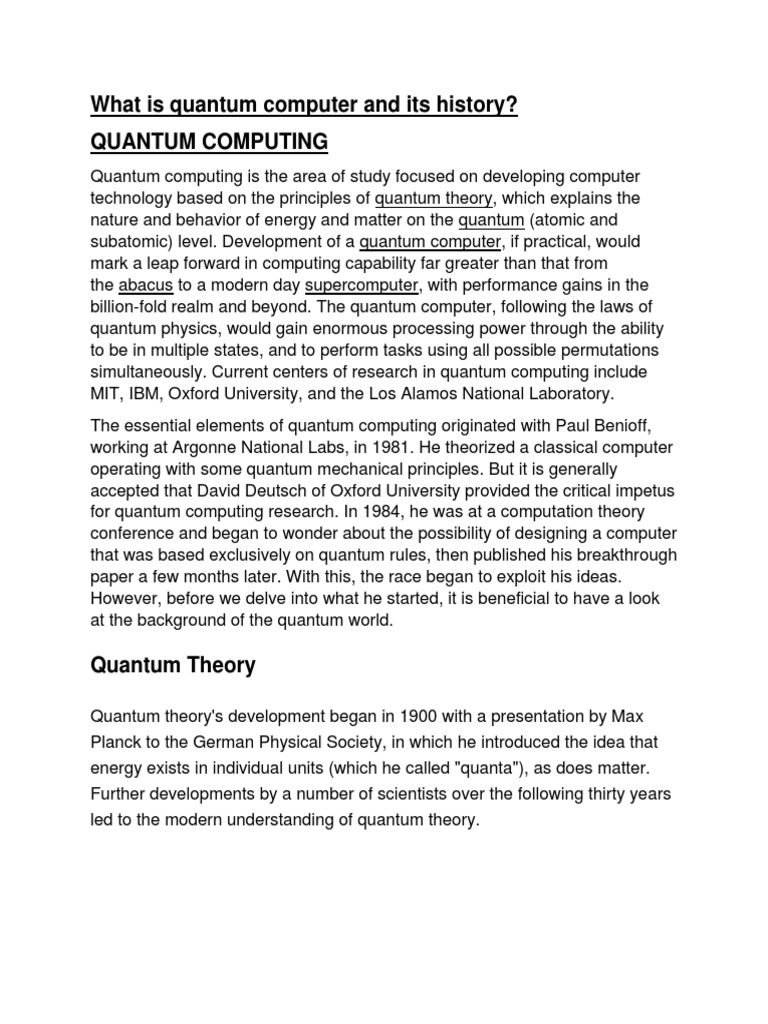Quantum computing stands as a revolutionary paradigm in the realm of computational technology, promising to transcend classical limitations and fundamentally alter our approaches to problem-solving. The genesis of quantum computing can be traced back to the enigmatic principles of quantum mechanics, which govern the behavior of particles at the subatomic level. This intersection of computer science and quantum physics not only sparks curiosity but also evokes a sense of wonder about the capabilities of machines that harness the subtle nuances of quantum states.
At its core, quantum computing operates on qubits, or quantum bits, which differ fundamentally from classical bits. A classical bit exists as either a 0 or a 1, while a qubit can exist in a superposition of both states simultaneously. This remarkable property allows quantum computers to perform complex calculations at unprecedented speeds. The idea of superposition is complemented by entanglement, another hallmark of quantum mechanics, whereby the state of one qubit can be intrinsically connected to the state of another, regardless of the distance separating them. These unique characteristics lend quantum computing its extraordinary potential, while simultaneously contributing to the widespread fascination with the field.
Historically, the origins of quantum computing can be traced back to the theoretical musings of physicists like Richard Feynman and David Deutsch in the early 1980s. Feynman posed a critical question: could classical computers efficiently simulate quantum systems? He contended that classical machines, limited by their binary nature, would struggle with this task. In response, Deutsch formulated the concept of a quantum Turing machine, laying the groundwork for what would eventually evolve into contemporary quantum computing. This shift towards quantum analogs illuminated the inherent inadequacies of classical computation in modeling the complexities of quantum phenomena.
As the 1990s approached, the theoretical framework began to solidify with the development of groundbreaking algorithms, such as Shor’s algorithm for integer factorization and Grover’s algorithm for database searching. These algorithms underscored the potential for quantum computers to solve problems deemed intractable by classical means, particularly within cryptography and optimization realms. The acknowledgment that a quantum computer could efficiently factor large integers—a pivotal task in cryptography—has instigated a race among technologists and governmental entities to harness and develop quantum technology.
The exploration of quantum computing is not merely a matter of seeking efficiency; it raises profound epistemological questions. What does it mean to compute? How does the manipulation of probabilities and quantum states challenge our classical intuitions? The ability of quantum computers to process vast data sets using entangled qubits prompts a reevaluation of our understanding of information and its fundamental nature. It signifies not only a technological leap but a potential philosophical transformation, marking a shift from deterministic models to probabilistic frameworks.
Accompanying this intellectual intrigue is the pursuit of practical applications. Industries ranging from pharmaceuticals to finance are beginning to harness quantum computing’s capabilities. In drug discovery, for instance, quantum computing can simulate molecular interactions with unparalleled precision, drastically reducing the time required for identifying viable compounds. Similarly, in finance, quantum algorithms can optimize portfolio management and risk assessment, fundamentally altering market strategies. The implications of these advancements suggest a revolutionary transformation that extends beyond mere computational speed.
However, the path to realizing the full potential of quantum computing is fraught with challenges. Quantum decoherence—the loss of quantum coherence and the resulting collapse of superposition—is a persistent hurdle. Maintaining the fragile quantum states necessary for computation requires sophisticated error correction and stabilization techniques. As researchers endeavor to build scalable quantum systems, the quest for a universal quantum computer remains elusive. The current landscape is characterized by a diversity of quantum computing modalities, including superconducting qubits, trapped ions, and topological qubits, each presenting unique advantages and research hurdles.
The role of quantum computing extends into broader societal implications as well. The advent of quantum cryptography promises unbreakable encryption, thereby bolstering national security and individual privacy. Yet, as the veil of quantum technology lifts, it predicates a need for dialogue concerning ethical considerations. The potential for unprecedented computational power raises questions about surveillance, autonomy, and the evolution of privacy in an increasingly interconnected world.
Ultimately, quantum computing embodies a convergence of multiple domains—physics, mathematics, and computer science—rendering it a profoundly interdisciplinary endeavor. Its role in tackling problems deemed insurmountable by classical methodologies not only cultivates technical advancements but also inspires a collective curiosity about the universe’s fabric. As we gaze into the future, the potential of quantum computing invites us to navigate uncharted territories, both intellectually and practically. It beckons society to reconsider the limits of knowledge and technology, urging us to ponder the intricacies of existence as we stand on the precipice of a new computational era.
In conclusion, quantum computing’s origin and evolving role integrate historical aspirations, theoretical advancements, and practical ramifications, captivating the imaginations of scientists and laypeople alike. The mysteries of the quantum realm continue to weave a narrative that promises to redefine not only computation but also our understanding of reality itself. Examining this rapidly developing field reveals our human inclination to explore the unknown—a quest that underscores the very essence of scientific inquiry.












